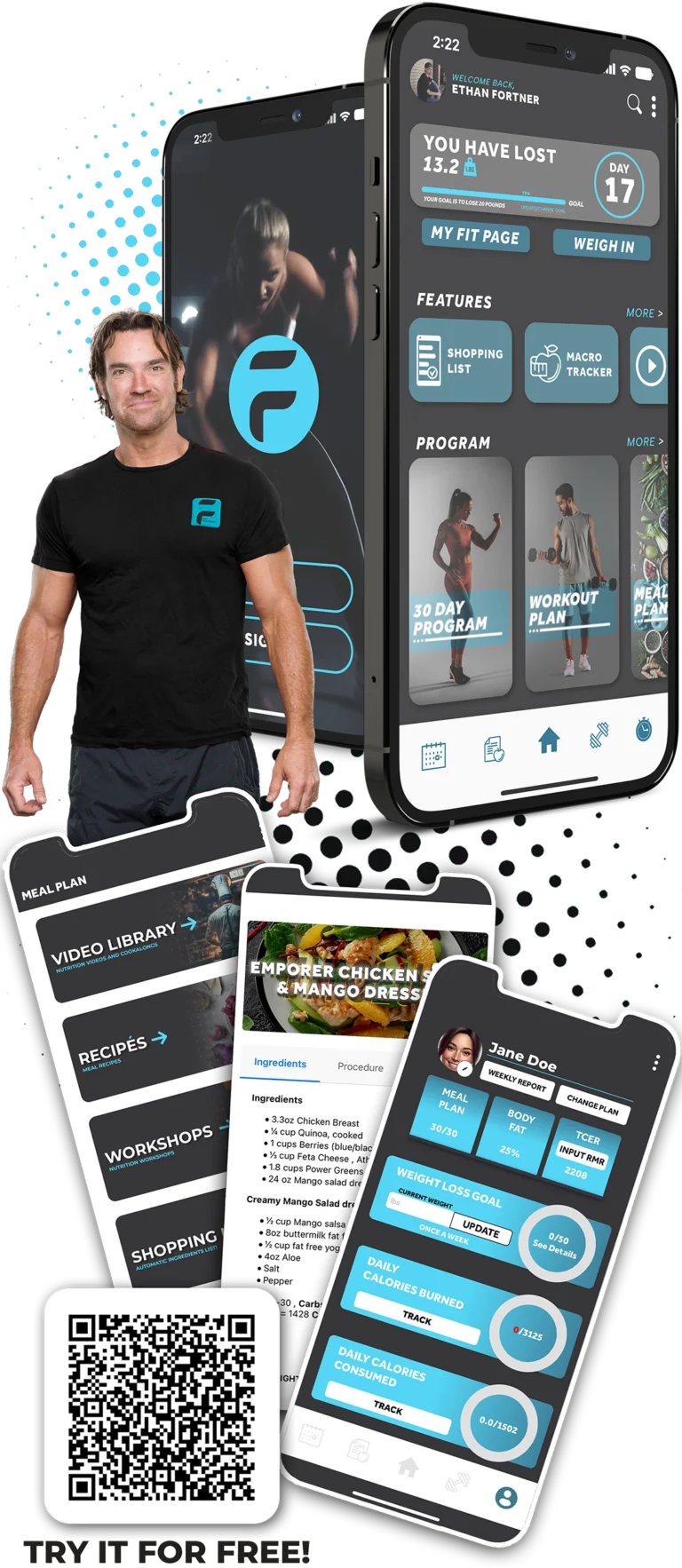
The Place To
Upgrade Your
Body Health Career Relationships Mindset Confidence Life









YOU MAY HAVE
SEEN ME ON
IM OBSESSED WITH HELPING YOU GET TO YOUR
HERO OUTCOME!
Hi, I'm Eric!
Master High-Performance coach
Over the last 26 years, I’ve perfected my world-renowned Fitness Retreat and built the most successful results-driven fitness and weight loss program. Now, with Fit Culture, you can access my expertise, advice, and proven methods from home.
Whether you join my retreat, take an online course, use the app, read my books, or need supplement advice— I’ve created everything here for you and guarantee it’s the best.
I am on a mission to give you all of the support and resources you need to not only elevate your body, but your life. To look and feel amazing, find & live your purpose, and to get off the hamster wheel you are on, and take action now. This is for you if you want to actively be guided, supported, and pushed to achieve your wildest dreams.
It’s all here, your Blueprint and more to living a happy, healthy, and fulfilled life, where you leave your mark on this world! It’s all waiting for you – you just need to take it.
I BELIEVE IN YOU!
anD i have your back!
You need someone who believes in you—and that’s exactly what I do. My clients don’t just achieve fitness goals; they experience life-altering transformations. With my expert coaching, I’ll help you break through years of self-doubt, shed the weight that’s been holding you back, and finally own the confidence you deserve. This is more than weight loss— it’s about unlocking your full potential and finally becoming the person you know you can be.
With Fit Culture, you don’t have to figure it all out on your own. I’ll guide you step-by-step with personalized workouts and nutrition plans designed just for you. Every move you make, every choice, we’ve got you covered. Just relax and follow my lead—because I’ll be right there with you, making sure you succeed. This is your moment, and I am here to help you own it.


GET CERTIFIED:
GRADUATE WITH A
BETTER BODY BETTER PURPOSE BETTER UNDERSTANDING A BETTER VERSION OF YOU!
MY SIGNATURE LIFE COACHING COURSES.
I built these 4 courses for people ready to stop holding back and start living at full throttle.
- Lifehack Master Class: No more roadblocks. Take control, level up, and build a life that leaves no room for regret.
- WEIGHT LOSS WARRIOR: obliterate fat and step into the strongest, fiercest version of yourself.
- ELITE ATHLETE: Designed for athletes hungry to elevate their game. Push harder, perform better, and unlock peak performance
- SPEAK FREELY: For People Who Stutter—Silence the fear, own your voice, and say what you mean with unshakable confidence.
If you’re done making excuses, this is where everything changes.
My Free Weight Loss Warrior Master Class is open for Active Enrollment!
ONE FITNESS AND WEIGHT LOSS APP TO RULE THEM ALL
THE FIT CULTURE APP
TRANSFORMATION AT YOUR FINGERTIPS!
Ever wondered what it would be like to experience the results of my fitness retreat without leaving your home? Now, you can. With the Fit Culture app, you get all the benefits of my life-changing Fitness Retreat, right at your fingertips The Fit Culture app is fully customized to YOU, and brings you the same transformative coaching, strategies, and tools, allowing you to embark on your fitness and weight loss journey anytime, anywhere.
Bring my Fitness Retreat home with The Fit Culture App!
- Custom 30 Day Meal Plans tailored to your body’s exact needs
- Targeted 30 Day Workout Plans designed for YOUR goals
- Life Coaching to break through mental and physical barriers
- An extensive Video Library packed with eric's expert guidance
- Macro Tracking that’s actually useful for YOU
- Hundreds of healthy recipes that fit your lifestyle
- Accountability tools that keep you motivated and on track.
FITNESS RETREAT
MY SIGNATURE ADULT WEIGHT LOSS CAMP!
Ready to jumpstart your weight loss journey and experience a transformation like no other? Join me at my world-renowned weight loss and fitness retreat, where you’ll experience a comprehensive and personalized approach to fitness and wellness that will change how you think about food and exercise.
You are unique. You need a plan that is designed for you specifically, and we do the testing and assessments that will give us the data to do just that. You need a program that will optimize your body and mind so that they work for you instead of against you. If you desire to look and feel amazing, and want to learn simple hacks to keep the extra pounds of fat off forever, this is the most effective and efficient place to achieve that. Here, you will:
- LOSE PURE BODY FAT
- GAIN LEAN MUSCLE
- REV UP YOUR METABOLISM
- MOVE FASTER, BETTER, YOUNGER
- REWIRE YOUR BRAIN FOR LIFELONG SUCCESS
This isn’t just a getaway—it’s the ultimate transformation experience!



“If you fail to plan, you are planning to fail”
- Benjamin Franklin
UNLOCK YOUR GREATNESS:
TWO BOOKS THAT WILL CHANGE YOUR LIFE!
Introducing Fighting Monsters and The Blueprint Method—your ultimate guides to unlocking your full potential and building the life of your dreams!
Fighting Monsters teaches you how to:
- OVERCOME INTERNAL AND EXTERNAL BATTLES
- DEVELOP MENTAL RESILIENCE TO PUSH THROUGH ADVERSITY
- LIFE COACHING TO BREAK THROUGH MENTAL AND PHYSICAL BARRIERS
The Blueprint Method offers a step-by-step guide to:
- DESIGN YOUR PERSONAL SUCCESS PLAN
- MAP OUT A CLEAR PATH TO ACHIEVE YOUR GOALS
- BUILD LASTING HABITS THAT LEAD TO TRANSFORMATION
My books go beyond quick fixes—they equip you with real, lasting tools for transformation. Whether you’re facing physical obstacles or mental roadblocks, these guides will help you break free and unlock a healthier, stronger, and more resilient version of yourself.
Everything you need to craft your personal success story is right here—waiting to lead you to the life you’ve always envisioned. Get your blueprint for success today!

I'VE GOT THE SECRET SAUCE!
IT'S TIME FOR A TOTAL BODY RESET!
Do you struggle with:
- ADRENAL ISSUES?
- HORMONAL IMBALANCES?
- GUT PROBLEMS?
- WATER RETENTION?
- BRAIN FOG?
- HAIR LOSS?
- SKIN ISSUES?
- FATIGUE?
I created my Fit Culture Fuel Supplements because I understand firsthand how overwhelming it can be to manage these symptoms. With so many supplements, electrolytes, and vitamins to take, it felt frustrating and cluttered. I needed:
- AN EASY AND AFFORDABLE SOLUTION
- SUPERFOODS PACKED INTO 4 SIMPLE PRODUCTS
- A WAY TO HEAL MY BODY HOLISTICALLY
When I started taking these supplements, the transformation in my body was revolutionary. Now, I’m sharing that same healing journey with you—so you can take control of your health without confusion or clutter.

BECOME A
FIT CULTURE INSIDER!
I WANT TO CONNECT WITH YOU!
I’m beyond excited to share my personal fitness and life-changing secrets with you—the same strategies I use with top clients. This is exclusive access you won’t get anywhere else. Ready to unlock your full potential? Let’s get started!




